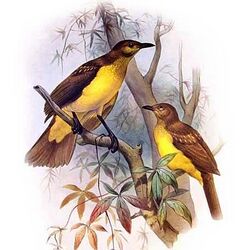Biology:Yellow-breasted bowerbird
| Yellow-breasted bowerbird | |
|---|---|

| |
| Scientific classification | |
| Domain: | Eukaryota |
| Kingdom: | Animalia |
| Phylum: | Chordata |
| Class: | Aves |
| Order: | Passeriformes |
| Family: | Ptilonorhynchidae |
| Genus: | Chlamydera |
| Species: | C. lauterbachi
|
| Binomial name | |
| Chlamydera lauterbachi Reichenow, 1897
| |
The yellow-breasted bowerbird (Chlamydera lauterbachi) also known as Lauterbach's bowerbird, is a medium-sized, approximately 27 cm long, bowerbird with a brownish-olive upperparts plumage, grayish-yellow upper breast, coppery crown, dark brown iris, yellow underparts, a black bill and pinkish-orange mouth. Both sexes are similar. The female exhibits less vibrant coloration than the male.
Habitat
The yellow-breasted bowerbird is distributed on mainland New Guinea, where it inhabits grasslands, lowlands, and subtropical mountain forests. Its diet mainly consists of fruits, caterpillars, beetles, and other insects. The nest is a shallow cup made of small sticks located in a tree. The bower itself is of the "avenue" type, with four walls made of sticks and an outward-angled main avenue wall.
The scientific name commemorates its discoverer, the Germany botanist Carl Lauterbach. He discovered this bowerbird in 1896.
Widespread and a common species throughout its habitat range, the yellow-breasted bowerbird is evaluated as Least Concern on the IUCN Red List of Threatened Species.
References
- ↑ BirdLife International (2016). "Chlamydera lauterbachi". IUCN Red List of Threatened Species 2016: e.T22703700A93933176. doi:10.2305/IUCN.UK.2016-3.RLTS.T22703700A93933176.en. https://www.iucnredlist.org/species/22703700/93933176. Retrieved 11 November 2021.
External links
Wikidata ☰ Q839923 entry
 |


